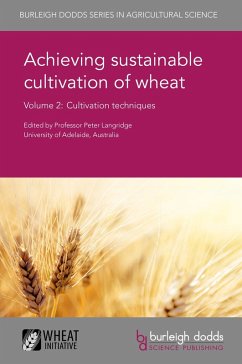'These books present a comprehensive coverage of issues facing wheat production globally. The authors represent the top scientists involved in the diverse areas that are important for sustainable wheat production and will this book provides an excellent resource for those interested in wheat improvement and production.' (Dr Hans-Joachim Braun, Director Global Wheat Program and CRP Wheat, International Maize and Wheat Improvement Center (CIMMYT),Mexico)
'With their range of topics and authors, these volumes promise to be a standard reference for wheat scientists.' (Professor Rudy Rabbinge, Emeritus Professor of Sustainable Development and Food Security, Wageningen University, The Netherlands; also formerly the Consultative Group on International Agricultural Research (CGIAR) and the Alliance for a Green Revolution in Africa (AGRA).
'With their breadth of coverage, distinguished editor and the international expertise of the contributing authors, these two volumes promise to be a standard reference for wheat scientists around the world.' (Dr Sanjaya Rajaram, Winner of the 2014 World Food Prize and Former Director of the Global Wheat Program at The International Wheat Maize and Wheat Improvement Center (CIMMYT))
Wheat is the most widely cultivated cereal in the world and a staple food for around 3 billion people. It has been estimated that demand for wheat could increase by up to 560% by 2050. There is an urgent need to increase yields in the face of such challenges as climate change, threats from pests and diseases and the need to make cultivation more resource-efficient and sustainable.
Drawing on an international range of expertise, this collection focuses on ways of improving the cultivation of wheat at each step in the value chain, from breeding to post-harvest storage. Volume 1 reviews research in improving cultivation techniques. Chapters in Part 1 review topics such as variety selection, seed and root growth, water and nutrient management. Part 2 goes on to discuss broader issues such as sustainable intensification and organic cultivation. The final part of the collection covers ways of improving wheat cultivation in the developing world.
Achieving sustainable cultivation of wheat Volume 2: Cultivation techniques will be a standard reference for cereal scientists in universities, government and other research centres and companies involved in wheat cultivation. It is accompanied by Volume 1 which reviews breeding, quality traits, pests and diseases.
Dr Peter Langridge is Emeritus Professor of Plant Science at the University of Adelaide and former CEO of the Australian Centre for Plant Functional Genomics (ACPFC). Professor Langridge is also Chair of the Scientific Board of the Wheat Initiative set up to coordinate international research in wheat.
'With their range of topics and authors, these volumes promise to be a standard reference for wheat scientists.' (Professor Rudy Rabbinge, Emeritus Professor of Sustainable Development and Food Security, Wageningen University, The Netherlands; also formerly the Consultative Group on International Agricultural Research (CGIAR) and the Alliance for a Green Revolution in Africa (AGRA).
'With their breadth of coverage, distinguished editor and the international expertise of the contributing authors, these two volumes promise to be a standard reference for wheat scientists around the world.' (Dr Sanjaya Rajaram, Winner of the 2014 World Food Prize and Former Director of the Global Wheat Program at The International Wheat Maize and Wheat Improvement Center (CIMMYT))
Wheat is the most widely cultivated cereal in the world and a staple food for around 3 billion people. It has been estimated that demand for wheat could increase by up to 560% by 2050. There is an urgent need to increase yields in the face of such challenges as climate change, threats from pests and diseases and the need to make cultivation more resource-efficient and sustainable.
Drawing on an international range of expertise, this collection focuses on ways of improving the cultivation of wheat at each step in the value chain, from breeding to post-harvest storage. Volume 1 reviews research in improving cultivation techniques. Chapters in Part 1 review topics such as variety selection, seed and root growth, water and nutrient management. Part 2 goes on to discuss broader issues such as sustainable intensification and organic cultivation. The final part of the collection covers ways of improving wheat cultivation in the developing world.
Achieving sustainable cultivation of wheat Volume 2: Cultivation techniques will be a standard reference for cereal scientists in universities, government and other research centres and companies involved in wheat cultivation. It is accompanied by Volume 1 which reviews breeding, quality traits, pests and diseases.
Dr Peter Langridge is Emeritus Professor of Plant Science at the University of Adelaide and former CEO of the Australian Centre for Plant Functional Genomics (ACPFC). Professor Langridge is also Chair of the Scientific Board of the Wheat Initiative set up to coordinate international research in wheat.
Dieser Download kann aus rechtlichen Gründen nur mit Rechnungsadresse in A, D ausgeliefert werden.


